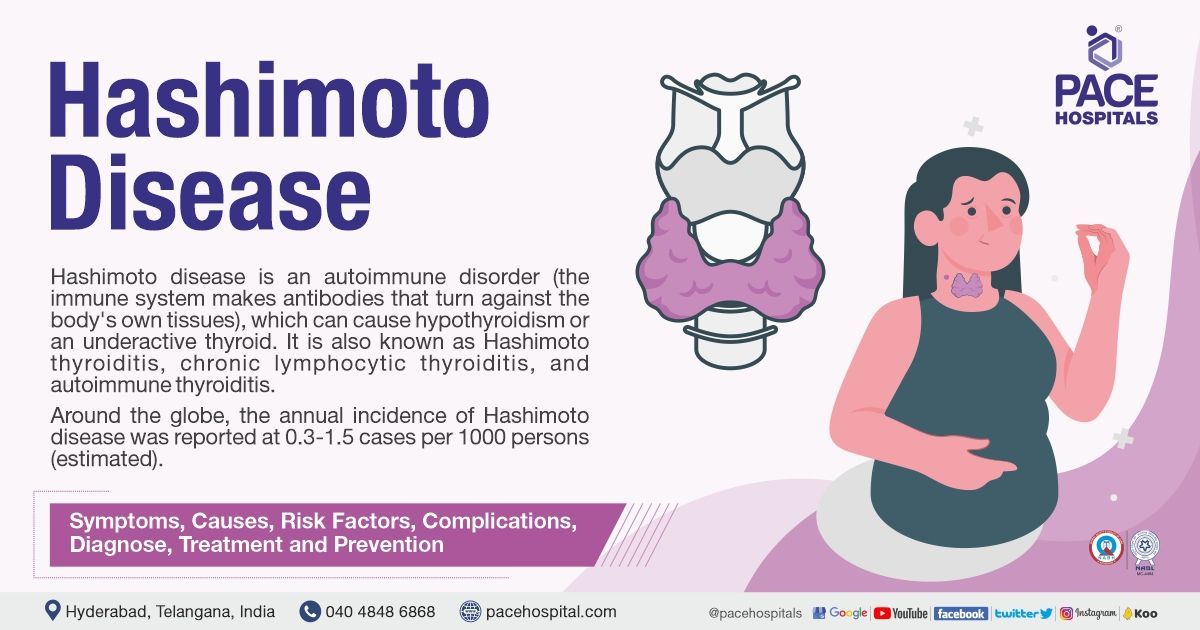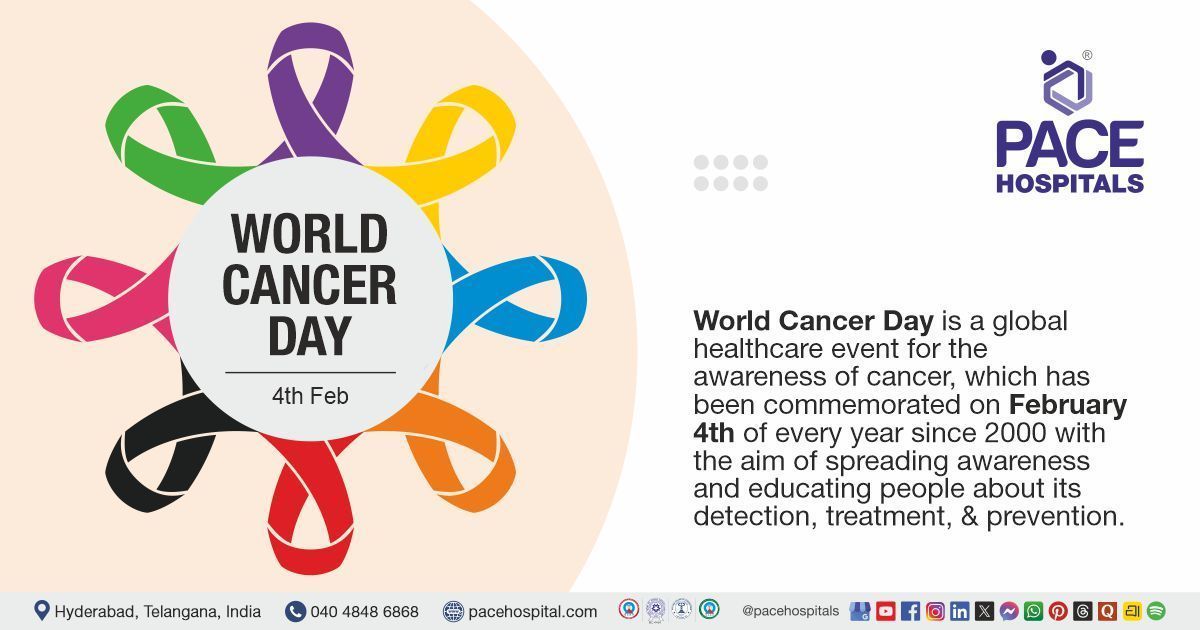(Hashimoto's thyroiditis) Hashimoto’s disease – Symptoms, Causes and Complications
PACE Hospitals
Hashimoto's disease is an autoimmune disorder (the immune system makes antibodies that turn against the body's own tissues), which can cause hypothyroidism or an underactive thyroid. It is also known as Hashimoto’s thyroiditis or chronic lymphocytic thyroiditis or autoimmune thyroiditis.
The thyroid is a little gland at the front of the neck that resembles a butterfly shape. When Hashimoto's disease is present, the immune system's mediated antibodies attack the thyroid gland, leading to the accumulation of excessive quantities of white blood cells (part of the immune system) that harm the thyroid gland. As a result, the thyroid is not able to produce adequate thyroid hormones, resulting in hypothyroidism.
Around the globe, the annual incidence of Hashimoto disease was reported at 0.3-1.5 cases per 1000 persons (estimated). The symptoms of Hashimoto disease are similar to those of hypothyroidism, as Hashimoto disease causes hypothyroidism. Medication such as hormone replacement therapy is used to treat hypothyroidism in the majority of patients who have Hashimoto disease. If the patient has mild hypothyroidism, they may not require any treatment. However, the physician might suggest a routine thyroid-stimulating hormone test to keep an eye on thyroid hormone levels.
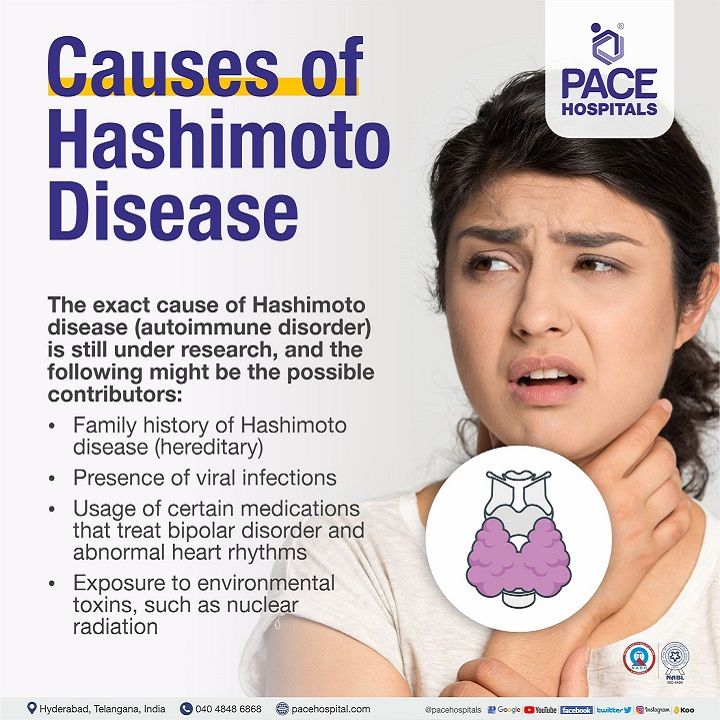
(Hashimoto's disease) Hashimoto’s Thyroiditis Causes
The exact cause of Hashimoto disease (autoimmune thyroiditis) is still under research, and the following might be the possible contributors:
- Genes: The presence of Hashimoto disease or other autoimmune diseases in the family history may increase the likelihood of disease occurrence.
- Viral infections: According to research, viral infections such as hepatitis C (which attacks the liver and causes inflammation) have autoimmune phenomena, which include rheumatoid arthritis, thyroid disease, cryoglobulinaemia, immune thrombocytopenic purpura, systemic lupus erythematous, and Sjogren syndrome.
- Usage of certain medications: Medications that are used to treat bipolar disorder, other mental health problems, and abnormal heart rhythms have the potential to cause Hashimoto disease.
- Exposure to environmental toxins, such as nuclear radiation.
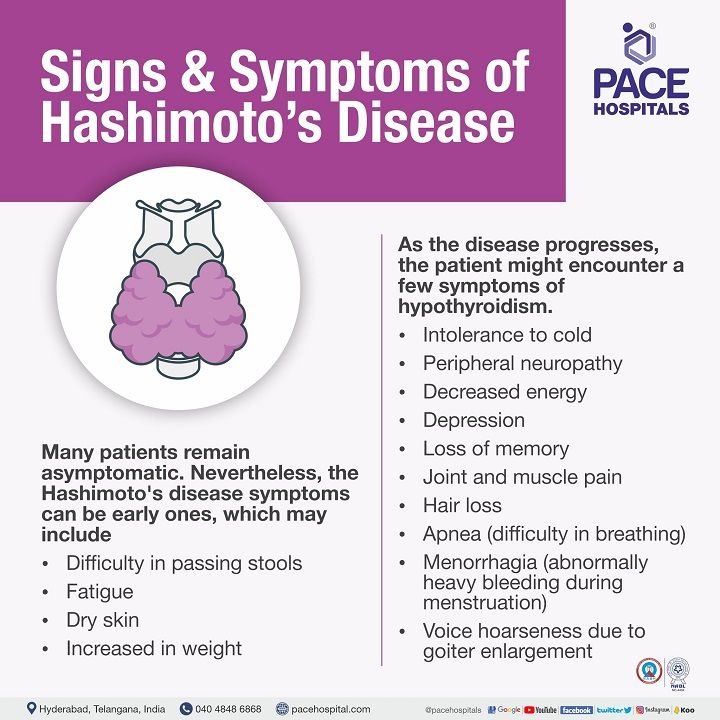
(Hashimoto’s Thyroiditis) Hashimoto’s Disease Symptoms
Many patients remain asymptomatic. Nevertheless, the Hashimoto's disease (autoimmune thyroiditis) symptoms can be early ones, which may include:
- Difficulty in passing stools
- Fatigue
- Dry skin
- Increased in weight
- As the disease progresses, the patient might encounter a few symptoms of hypothyroidism.
- Intolerance to cold
- Peripheral neuropathy
- Decreased energy
- Depression
- Loss of memory
- Joint and muscle pain
- Hair loss
- Apnea (difficulty in breathing)
- Menorrhagia (abnormally heavy bleeding during menstruation)
- Voice hoarseness due to goiter enlargement
In extremely rare cases, hyperthyroidism symptoms can manifest themselves early in the course of the disease due to the release of excessive amounts of thyroid hormone into the blood due to thyroid damage.
Physical findings of Hashimoto's Disease (Hashimoto's thyroiditis) include:
- Ataxia (difficulty in co-ordination, balance and speech)
- Bradycardia (decreased heart rate)
- Brittle nails
- Dry skin
- Increase in blood pressure
- Macroglossia (enlarged tongue)
- Periorbital facial oedema and nonpitting oedema in the hands and feet
- Slurred speech
- Delayed in relaxation phase of tendon reflexes
(Hashimoto's Disease) Hashimoto's Thyroiditis Risk Factors
The risk factors of Hashimoto disease are as follows:
- Women are more susceptible (4 to 10 times) compared to men. This illness can strike at any time in a woman's life, but it typically manifests insidiously between the ages of 30 and 50.
- Patients with any other autoimmune disorders are prone to having Hashimoto disease, which includes:
- Celiac disease
- Lupus
- Rheumatoid arthritis
- Sjogren’s syndrome
- Type 1 diabetes
- Family history of having Hashimoto or thyroid disease.
- Patients who are exposed to high environmental radiation levels.
(Hashimoto's Disease) Hashimoto's Thyroiditis Complications
Many people with Hashimoto disease can develop hypothyroidism. If unmanaged, hypothyroidism can lead to several health problems, including:
- Heart problems like low heart rate, hypertension, and heart failure.
- Occurrence of Goitre (an enlargement of the thyroid gland that manifests as a bump on the front of the neck).
- Myxoedema a rare, fatal and extreme complication of hypothyroidism characterised by profound cognitive and behavioural changes as well as multiple organ abnormalities.
- Increase in low-density lipoprotein (bad cholesterol).
(Hashimoto Thyroid Disease) Hashimoto's thyroiditis diagnosis
(Hashimoto's disease) Hashimoto's thyroiditis symptoms may be triggered by a variety of health issues. To diagnose the autoimmune thyroiditis condition, the physician may consider the following factors.
Patient’s medical and family history:
- Presence of Hashimoto disease in the patient’s family
- Environmental radiation exposure
- Usage of medications which can cause autoimmune diseases
- Presence of any previous viral infections
Physical exam:
The physician will look for enlargement of the thyroid gland and physical findings
Blood tests: After collecting a family and medical history followed by a physical examination, the physician might ask for one or all of the below-mentioned blood tests in order to assess the presence of hypothyroidism.
- Thyroid-stimulating hormone (TSH) test
- Test for Total T4, T3 and Free T4
- Thyroid antibody test (for Hashimoto disease)
(Hashimoto's disease) Hashimoto's thyroiditis treatment
(Hashimoto's disease) Hashimoto's thyroiditis treatment consists of pharmacotherapy management with hormone replacement therapy. This therapy cannot reverse Hashimoto disease, and it can help normalise hormone levels and metabolism.
Thyroid hormone replacement therapy is an effective treatment for Hashimoto disease. Synthetic thyroxine is the most commonly used thyroid hormone replacement. Once the patient's treatment has begun, the doctor may ask for a TSH test on a regular basis (6-10 weeks) to monitor thyroid function and determine the appropriate dose.
Hormone replacement therapy agents are available in various dosages. The patient’s dose will be determined based on -
- Age
- Weight
- Severity of hypothyroidism
- Other health problems
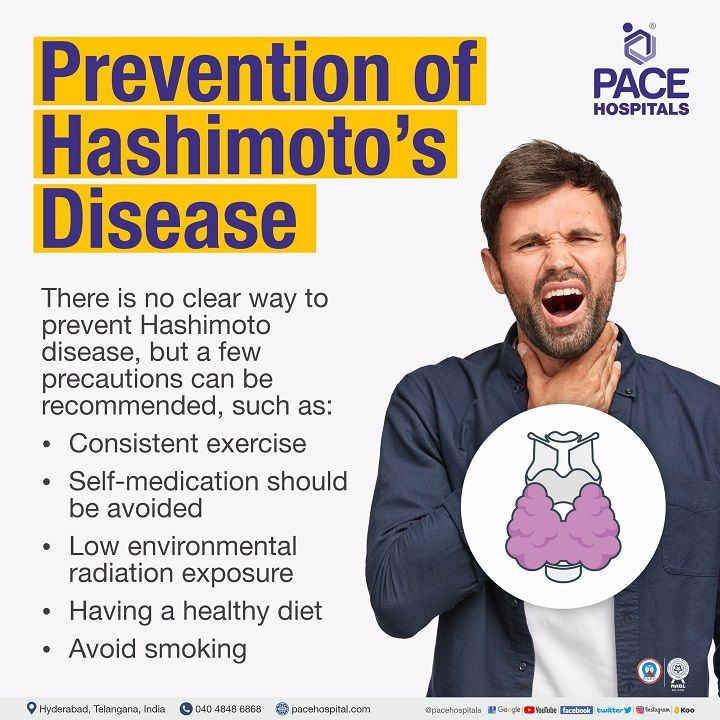
(Hashimoto's disease) Hashimoto's thyroiditis prevention
Hashimoto's disease is an autoimmune disorder caused by an immune system malfunction. There is no known way to prevent hashimoto's disease or hashimoto's thyroiditis, but a few precautions can be recommended, such as:
- Consistent exercise
- Self-medication should be avoided
- Low environmental radiation exposure
- Having a healthy diet
- Trying to avoid smoking
Hashimoto's disease vs Hypothyroidism | Difference between Hashimoto's disease and Hypothyroidism
| Elements | Hashimoto's Disease | Hypothyroidism |
|---|---|---|
| Definition | It is a form of autoimmune disease in which the body's immune system malfunctions and attacks the thyroid gland. | Also known as underactive thyroid, producing an insufficient amount of thyroid hormones. |
| Symptom | Hypothyroidism is one of the symptoms of Hashimoto disease. | Hashimoto disease is one of the causative factors for hypothyroidism. |
| Diagnostic parameters | The presence of TPO antibodies in the blood signifies the presence of Hashimoto disease along with high TSH, and low T4 blood levels. | A high TSH level and a low T4 level in the blood could indicate an underactive thyroid condition. |
Frequently Asked Questions (FAQs) on Hashimoto’s Disease
Share on
Request an appointment
Fill in the appointment form or call us instantly to book a confirmed appointment with our super specialist at 04048486868
Appointment request - health articles
Recent Articles


